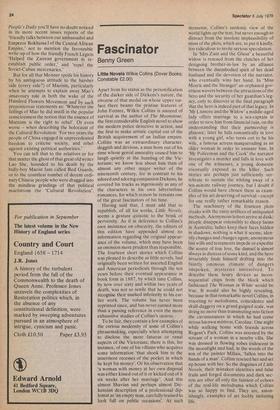Fascinator
Benny Green
Little Novels Wilkie Collins (Dover Books: Constable £2.00) Apart from his status as the personification of the darker side of Dickens's nature, the obverse of that medal on whose upper surface there beams the pristine features of John Forster, Wilkie Collins is assured of survival as the author of The Moonstone, the first considerable English novel to show the modern police detective in action, and the first to make artistic capital out of the British acquirement of an Indian empire. Collins was an extraordinary character, doggish and devious, a man born out of his time whose genial amorality caused him to laugh quietly at the humbug of the Victorians; we know less about him than of almost any other major writer of the nineteenth century, for in contrast to his adored and adoring companion Dickens, he covered his tracks as ingeniously as any of the characters in his own labyrinthine romances, for which reason he remains one of the great fascinators of his time.
Having said that, I must add that to republish, of all his works, Little Novels, seems a gesture quixotic to the brink of perversity. As if in deference to Collins's own insistence on obscurity, the editors of this edition have appended almost no information regarding the original appearance of the volume, which may have been an omission more prudent than responsible. The fourteen short stories which Collins was pleased to describe as little novels, had originally been written for assorted English and American periodicals through the ten years before their eventual appearance in book form in 1887, by which time Collins, by now over sixty and within two years of death, was not so senile that he could not recognise their marked inferiority to his earlier work. The volume has never been reprinted since, and has never earned more than a passing reference in even the more exhaustive studies of Collins's oeuvre.
To be fair, they contain a few examples of the curious modernity of some of Collins's phrasemaking, especially when attempting to disclose the more fatuous or venal aspects of the Victorians; there is this, for instance, of one of his villains who acquires some information 'that shook him to the innermost recesses of the pocket in which he kept his money'. Or his observation that 'a woman with money at her own disposal was either kissed out of it or kicked out of it six weeks after her marriage'. And this almost Shavian and perhaps almost Dickensian description of a professional diplomat as 'an empty man, carefully trained to look full on public occasions'. At such
moments, Collins's sardonic view of the world tights up the text, but never enough to distract from the insolent implausibility of most of the plots, which are, to put it kindly, too ridiculous to invite serious speculation.
In 'Mrs Zant and the Ghost' a beautiful widow is rescued from the clutches of her designing brother-in-law by an alliance between the disembodied spirit of her dead husband and the devotion of the narrator, who eventually wins her hand. In 'Miss Morris and the Stranger' an orphaned governess wavers between the attractions of the hero and the security of her guardian's legacy, only to discover in the final paragraph that the hero is indeed part of that legacy. In 'Mr Lismore and the Widow' a middle-aged lady offers marriage to a sea-captain in order to save him from financial ruin, on the understanding that their partnership is platonic; later he falls romantically in love with a young girl, who turns out to be his wife, a famous actress masquerading as an older woman in order to ensnare him. In 'Mr Policeman and the Cook' the narrator investigates a murder and falls in love with one of the witnesses, a young domestic eventually exposed as the killer. Such stories are perhaps just sufficiently vertebrate to sustain the whiling away of a ten-minute railway journey, but I doubt if Collins would have chosen them as examples of his art deserving of survival — except for one really rather remarkable reason.
The machinery of the fourteen plots creaks with the rusty artifices of antiquated methods. Anonymous letters arrive at dusk; people disappear ostensibly to sheep farms in Australia; ladies keep their faces hidden in shadows; nothing is what it seems; identity changes and changes again; anonymous last wills and testaments impede or expedite the source of true love, the damsel is almost always in distress of some kind, and the hero invariably finds himself drifting into the faintly ominous climate of dangers unspoken, mysteries unresolved. To describe these hoary devices as inconsequential chips from the block which fashioned The Woman in White would be true. It would also be highly revealing, because in that remarkable novel Collins, in resorting to melodrama, coincidence and skull-duggery on a grand guignol scale, was doing no more than transmuting into fiction the circumstances in which he had come across his own mistress, Caroline. One night while walking home with friends across Regent's Park, Collins was arrested by the scream of a woman in a nearby villa. She was dressed in flowing robes iridescent in the moonlight and had, in the words of the son of the painter Millais, 'fallen into the hands of a man'. Collins rescued her and set up house with her. So the disguises of Little Novels, their mistaken identities and false trails and forged documents and dark secrets are after all only the faintest of echoes of the real-life melodrama which Collins was so happy to find. They are, astonishingly, examples of art feebly imitating life.


































 Previous page
Previous page